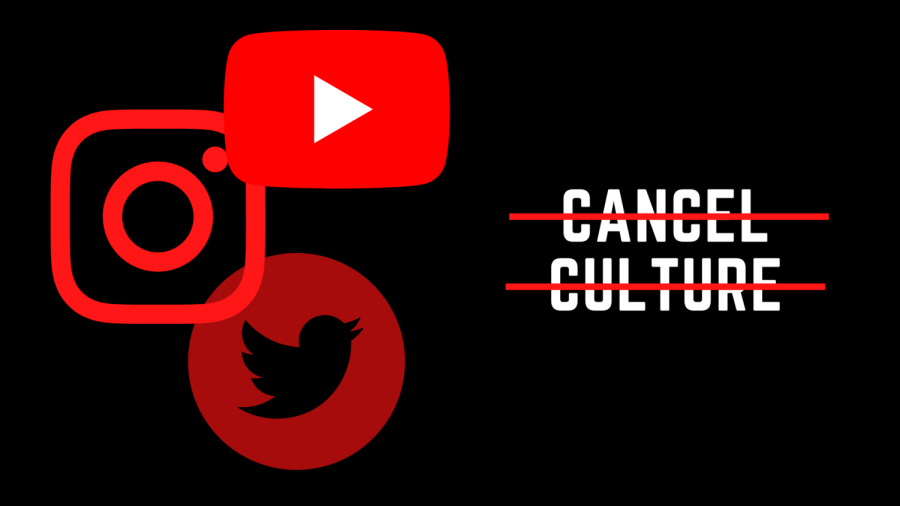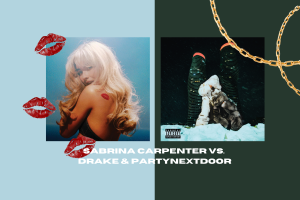Why cancel culture is unsuccessful
A graphic representing cancel culture displays different social media platforms in which cancel culture is carried out on.
January 25, 2023
Lately, the media has been whining about “cancel culture,” but I haven’t seen many people who have actually been canceled.
Cancel culture is described as boycotting, rejecting, or disengaging from a public figure due to an offensive action or controversy, but now any type of public shaming or criticism is falsely labeled “cancel culture.” This often results in a public figure being de-platformed or the loss of their career.
When a person, group, or organization does something immoral, society is justified to criticize them. This isn’t new, it’s happened for a while – a prime example being the civil rights movement. Injustice occurred, so boycotts followed. Only now with social media, this criticism is happening more rapidly and is thus dramatized.
Oftentimes social media users claim to be “canceling” someone for their wrongdoings. In many cases, this couldn’t be further from the truth: they’re just sending hate messages and shaming a public figure for a short period only to quickly forget about it. One only has to consider the situation in which beauty influencer James Charles admitted to having inappropriate conversations with minors. He received a brief period of backlash, then things returned to normal. Twitter users mass-making memes and comments about a controversy does nothing. Rather than acting as a form of accountability, cancel culture behaves as a childish trend.
Celebrities get worked up over the threat of cancel culture when in actuality they have nothing to worry about. They can make offensive comments, and at the end of the day, there will still be millions of fans to support them. That’s because as a society, the need to be entertained will always outweigh morality. Thus, problematic behavior never really has a lasting impact on one’s career and many people remain “uncancellable.”
Take TikToker Sienna Mae, for example, who was exposed for sexually assaulting her ex-boyfriend-– she still has millions of followers and fans falling at her feet. And Chris Brown, who has confirmed assault charges, still has a career and a supportive fan base because many people can’t let go of his music. If cancel culture truly existed, these people would be shunned by their respective industries. However, this is not the case.
These celebrities didn’t get canceled. They got temporary backlash as a consequence of their actions, due to the natural human desire to ostracize those who violate social norms or expectations in order to maintain social order, social justice, and accountability.
These incidents don’t ruin careers, as many claim. Even worse, it’s evident that people who get “canceled” end up being more famous than they were before, with controversy only widening their platform instead of taking it away.
For example, every time social media personality Trisha Paytas gets less relevant, she does something problematic so that people talk more about her. She’s been “canceled” many times for a variety of things such as using racial slurs, spreading misinformation about DID (dissociative identity disorder), and creating a number of racist YouTube videos. She’s aware that the more controversial she is, the more views she gets, which means the more money she makes. So-called “cancel culture” ends up giving people more attention when the original goal was the opposite.
In the past few years, there has been a clear cultural shift in which, through the use of social media, marginalized groups are able to call out offensive behavior. And so those being called out negatively label the criticism as “cancel culture.”
Critics of cancel culture are typically against it because they believe it to be unfair and an inhibitor of free speech. However, it’s important to note that freedom of speech does not mean freedom from consequences.
Contrary to popular belief, cancel culture hasn’t been “taken too far.” Cancel culture does exist, but not in the enormity that people claim. What’s happening is that celebrities are struggling to adjust to the reality that certain behavior is no longer accepted by society. Rejectionists have labeled and will continue to label any form of accountability as discriminatory in order to avoid addressing the real issues at hand.
Cancel culture is often misunderstood and exaggerated in the media and the true definition has been lost. While it has existed for a long time, social media has amplified the power and reach of canceled culture. Society is justified to hold people accountable for their actions, however, its desire for entertainment more than morality is a prime reason that canceling culture will more times than not be unsuccessful.








